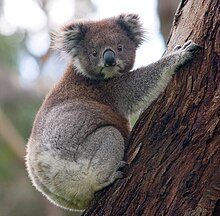The Phascolarctidae (φάσκωλος (phaskolos) - pouch or bag, ἄρκτος (arktos) - bear, from the Greek phascolos + arctos meaning pouched bear) is a family of marsupials of the order Diprotodontia, consisting of only one extant species, the koala,[1] and six well-known fossil species, with another six less well known fossil species, and two fossil species of the genus Koobor, whose taxonomy is debatable but are placed in this group. The closest relatives of the Phascolarctidae are the wombats, which comprise the family Vombatidae.[2]
| Phascolarctidae[1] Temporal range:
| |
|---|---|

| |
| Phascolarctos cinereus | |
| Scientific classification | |
| Domain: | Eukaryota |
| Kingdom: | Animalia |
| Phylum: | Chordata |
| Class: | Mammalia |
| Infraclass: | Marsupialia |
| Order: | Diprotodontia |
| Suborder: | Vombatiformes |
| Infraorder: | Phascolarctomorphia Aplin & Archer, 1987 |
| Family: | Phascolarctidae Owen, 1839 |
| Genera | |
The fossil record of the family dates back to the Middle Miocene[3] or Late Oligocene.[4]
Classification
editFamily Phascolarctidae[1]
- Genus †Nimiokoala
- Genus †Invictokoala[5]
- †Invictokoala monticola
- Genus †Madakoala
- †Madakoala robustus
- †Madakoala wellsi
- †Madakoala devisi
- Genus †Litokoala
- †Litokoala garyjohnstoni
- †Litokoala kutjamarpensis
- †Litokoala kanunkaensis
- Genus †Lumakoala
- †Lumakoala blackae[6]
- Genus †Koobor
- †Koobor jimbarrati
- †Koobor notabilis
- Genus †Perikoala
- †Perikoala palankarinnica
- †Perikoala robustus
- Genus Phascolarctos
- †Phascolarctos maris
- Koala - Phascolarctos cinereus
- †Giant koala - Phascolarctos stirtoni
- †Phascolarctos yorkensis (formerly Cundokoala yorkensis)[7]
- Genus †Priscakoala
- †Priscakoala lucyturnbullae[4]
References
edit- ^ a b c Groves, C. P. (2005). "Family Phascolarctidae". In Wilson, D. E.; Reeder, D. M (eds.). Mammal Species of the World: A Taxonomic and Geographic Reference (3rd ed.). Johns Hopkins University Press. p. 43. ISBN 978-0-8018-8221-0. OCLC 62265494.
- ^ Groves, C. P. (2005). "Suborder Vombatiformes". In Wilson, D. E.; Reeder, D. M (eds.). Mammal Species of the World: A Taxonomic and Geographic Reference (3rd ed.). Johns Hopkins University Press. pp. 43–44. ISBN 978-0-8018-8221-0. OCLC 62265494.
- ^ Benton, M.J. (2005). Vertebrate Palaeontology. Oxford. p. 314.
- ^ a b Karen Black; et al. (2012). "New Tertiary koala (Marsupialia, Phascolarctidae) from Riversleigh, Australia, with a revision of phascolarctid phylogenetics, paleoecology, and paleobiodiversity". Journal of Vertebrate Paleontology. 32 (1): 125–138. Bibcode:2012JVPal..32..125B. doi:10.1080/02724634.2012.626825. S2CID 86152273.
- ^ Gilbert J. Price and Scott A. Hocknull (2011). "Invictokoala monticola gen. et sp. nov. (Phascolarctidae, Marsupialia), a Pleistocene plesiomorphic koala holdover from Oligocene ancestors". Journal of Systematic Palaeontology. 9 (2): 327–335. Bibcode:2011JSPal...9..327P. doi:10.1080/14772019.2010.504079. S2CID 84316375.
- ^ Arthur I. Crichton, Robin M. D. Beck, Aidan M. C. Couzens, Trevor H. Worthy, Aaron B. Camens and Gavin J. Prideaux; et al. (2023). "A probable koala from the Oligocene of central Australia provides insights into early diprotodontian evolution". Scientific Reports. 13 (1). 14521. doi:10.1038/s41598-023-41471-0. PMC 10477348. PMID 37666885.
{{cite journal}}: CS1 maint: multiple names: authors list (link) - ^ Talent, John A. (2012). Earth and Life. Springer. p. 1047. ISBN 9789048134281.
External links
editWikimedia Commons has media related to Phascolarctidae.
Wikispecies has information related to Phascolarctidae.